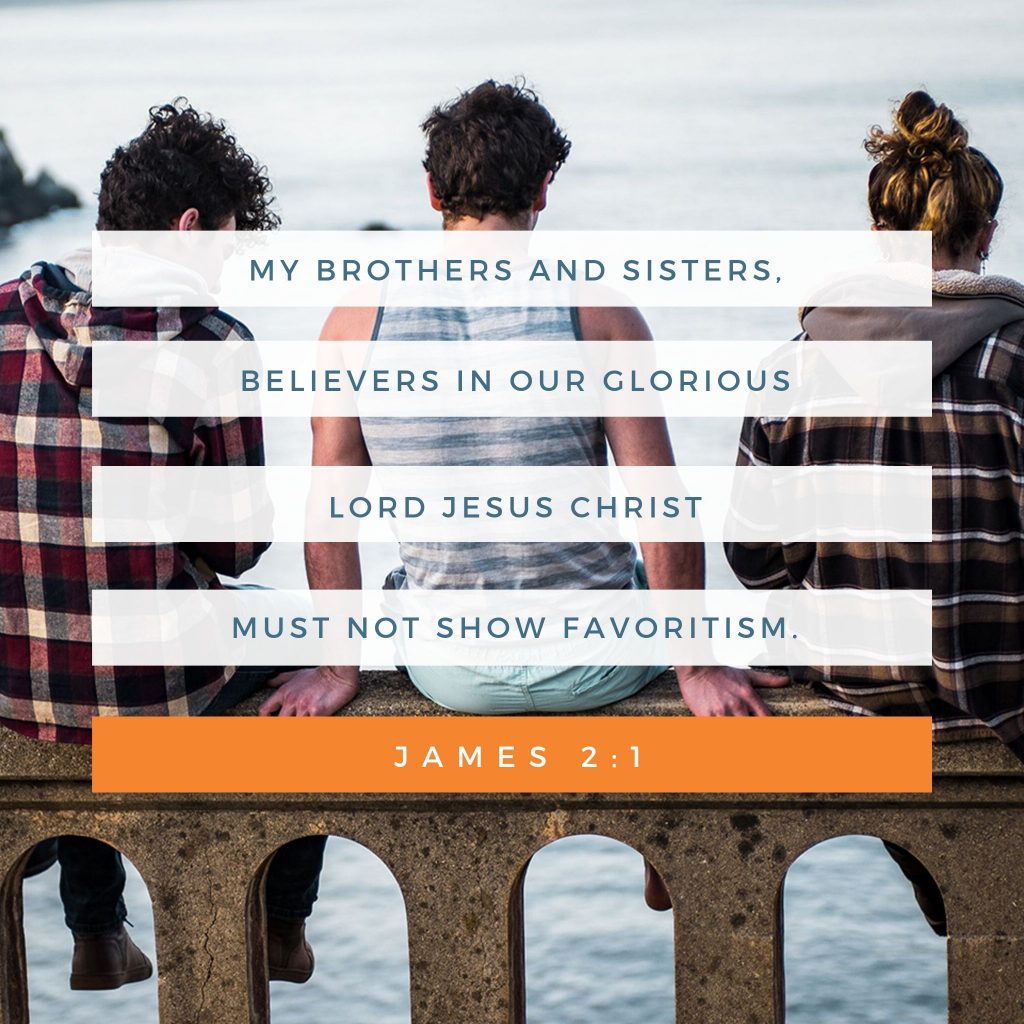September 25, 2019
Pastor Gunnar Ledermann
1 My brothers and sisters, believers in our glorious Lord Jesus Christ must not show favoritism. 2 Suppose a man comes into your meeting wearing a gold ring and fine clothes, and a poor man in filthy old clothes also comes in. 3 If you show special attention to the man wearing fine clothes and say, “Here’s a good seat for you,” but say to the poor man, “You stand there” or “Sit on the floor by my feet,” 4 have you not discriminated among yourselves and become judges with evil thoughts?
5 Listen, my dear brothers and sisters: Has not God chosen those who are poor in the eyes of the world to be rich in faith and to inherit the kingdom he promised those who love him? 6 But you have dishonored the poor. Is it not the rich who are exploiting you? Are they not the ones who are dragging you into court? 7 Are they not the ones who are blaspheming the noble name of him to whom you belong?
8 If you really keep the royal law found in Scripture, “Love your neighbor as yourself,” you are doing right. 9 But if you show favoritism, you sin and are convicted by the law as lawbreakers. 10 For whoever keeps the whole law and yet stumbles at just one point is guilty of breaking all of it. 11 For he who said, “You shall not commit adultery,” also said, “You shall not murder.” If you do not commit adultery but do commit murder, you have become a lawbreaker.
12 Speak and act as those who are going to be judged by the law that gives freedom, 13 because judgment without mercy will be shown to anyone who has not been merciful. Mercy triumphs over judgment.
James 2:1-13
I like to wave at people when I drive. It’s a habit I picked up from my parents. It doesn’t matter who it is driving by, I wave, and over the years, I have found it interesting to see how they wave back. Some drivers do nothing. Some drivers will keep their hand on the wheel and wave with just their pointer finger acknowledging that they saw the wave. Other drivers will put up two fingers as if to say, “Hi, have a nice day.” Finally, there are a few who will wave with all five fingers, and they are the ones who are so happy someone waved to them. The five-fingered wave, with the hand on the steering wheel, says, “Hi, hope and pray you are having a nice day! How’s your wife and kids? And did you catch the Cowboys game last week?” Waving at someone else while driving is an example of treating everyone the same because it does not matter who is in the car, they are getting a wave. In our reading from James 2, believers are given this warning, do not look at someone to decide how to treat them.
James was inspired by God to write his letter as a guide for those who held on to faith in Jesus. His letter dealt with the temptation to have faith in Jesus, but not show it. James’ point was that a person could not claim to have faith if their life had no evidence of faith. God said the same thing through the Apostle Paul in Colossians 3, 5 “Put to death, therefore, whatever belongs to your earthly nature.” When the earthly, sinful desires are put to death in the life of a believer, a vacuum is left that is filled with good, kind and loving things. This matches what Paul continued to write, in Colossians 3, 12 “Therefore, as God’s chosen people, holy and dearly loved, clothe yourselves with compassion, kindness, humility, gentleness and patience. 14 And over all these virtues put on love.” These are the good things James called those with faith to do when he wrote, 26 “…faith without deeds is dead.” He was not saying that a person must do something to be saved. Instead, he was saying that since we have been saved and set free from sin, we are free to go and live by the grace of God in wonderful freedom doing what is good and right. Specifically, in our section today from James 2, he said, 1 “My brothers and sisters, believers in our glorious Lord Jesus Christ must not show favoritism.”

James warned his brothers and sisters in the faith not to show favoritism because it breaks God’s law. The Greek word for favoritism, also translated as partiality, is a combination of two Greek words, the word for face and the word for take or receive. Thus, the word picture for favoritism is taking or receiving someone by their face. The universal warning James gave all believers was not to look at someone and then, based on what they look like, treat them in either a good way or a bad way. In other words, treating everyone the same is good and flows from faith, 9 “But if you show favoritism, you sin and are convicted by the law as lawbreakers.” Favoritism breaks God’s law because it is a false judgement against someone.
You and I fall into sin when we show favoritism because we base our judgments on the wrong factors. James gave an example of this when he wrote, 2 “Suppose a man comes into your meeting wearing a gold ring and fine clothes, and a poor man in filthy old clothes also comes in. 3 If you show special attention to the man wearing fine clothes and say, “Here’s a good seat for you,” but say to the poor man, “You stand there” or “Sit on the floor by my feet,” 4 have you not discriminated among yourselves and become judges with evil thoughts?” This example reveals how the sinful mind works. When a person sees someone who is wealthy, they want to treat them better hoping to share in their wealth. On the other hand, when a person sees someone is poor, they want nothing to do with them because they don’t see any benefit. The true nature of favoritism is a selfish heart that does not love others but loves finding more things for itself.
The sinful judgment of others is favoritism. You and I have both fallen into its trap. We have misjudged people and situations, and even if you are not struggling with that sin today, you are still guilty of God’s law, 10 “For whoever keeps the whole law and yet stumbles at just one point is guilty of breaking all of it.” The same sinful heart that causes one of you to show favoritism, causes another to lust, another to hate, another to gossip, etc. You and I share the root problem that leads to all kinds of sins, a lack of love. Love is what is missing from our sinful nature.
Love is also what saved us. In Mark 10:45, Jesus said, “For even the Son of Man did not come to be served, but to serve, and to give his life as a ransom for many.” When Jesus first saw you, he did not treat you as you looked. When he first saw you, there was no benefit to a relationship with you because he only saw a mind and heart eager to go against him. Jesus did not show favoritism to you, he did not judge you, even though he has the power to judge us according to the right factors. Instead, Jesus loved you and showed you mercy. He came to serve you, to show you love and mercy by giving up his good life as a sacrifice on the cross as a trade for your sinful life. You are free from sin and death, and alive to live in freedom and love.
You and I are able to decide how to treat others before we see them because Jesus set us free from sin. Faith in Jesus reveals itself by showing undeserved love to others, like God showed to us. Our hearts have been changed by the Holy Spirit and we now fight against those evil desires that would take God’s undeserved love for granted by not loving others, and instead we show love to others. James quoted from Leviticus and echoed Jesus’ words too writing, 8 “If you really keep the royal law found in Scripture, “Love your neighbor as yourself,” you are doing right.” When we show love to others, it is our faith bearing fruit and bearing witness to its existence in our heart.
Mercy allows us to see others as God sees them. God looks at the heart; his view of those who are rich and poor, is not like the world’s view. Those in the world who view themselves as rich and good, fail to view themselves by God’s standard. Again, recall the words from verse 10, “For whoever keeps the whole law and yet stumbles at just one point is guilty of breaking all of it.” Rather, those who view themselves according to God’s law and are humbled by his perfection and power. They live according to our reading from Proverbs 25, 6 “Do not exalt yourself in the king’s presence, and do not claim a place among his great men; 7 it is better for him to say to you, “Come up here,” than for him to humiliate you before his nobles.” Those who trust in God understand they have been given everything from him only because of his grace and mercy. Jesus also described this mercy in our gospel reading from Luke 14, “For all those who exalt themselves will be humbled, and those who humble themselves will be exalted.” Jesus saved all people from the same judgment. You and I are no better than anyone else. This understanding that comes from faith allows us to treat others with love and mercy regardless of how they look to us.
The freedom you have in Jesus from sin, death and the devil, also freed you to show no favoritism with mercy. Twice in this reading from James 2, he calls his fellow believers my brothers. In verse 5, he added the word love to describe his fellow believers as he wrote, 5 “…Has not God chosen those who are poor in the eyes of the world to be rich in faith and to inherit the kingdom he promised those who love him?” All of us who read this by faith respond, “Yes, God has promised us riches in the kingdom of heaven!” And, as members of that kingdom, we are called to show mercy. The final words from our reading from James 2 read, “Mercy triumphs over judgment.” We have no fear of judgment from God because Jesus had mercy on us. In John 1, John the Baptist saw Jesus and said, John 1:29 “Look, the Lamb of God, who takes away the sin of the world!” Jesus came to be judged in our place, to be seen by God as guilty, so that you and I would be free. In thankfulness and freedom through our Savior Jesus, we are called to look at every single person without favoritism or partiality, but with love. This is our faith alive and active. And, we pray that through our love for them, we would get the chance to share with others God’s love for them.
I like to wave at people when I drive. It doesn’t matter who it is driving by, I wave. In a manner of speaking, God has called you to wave at all people because he has called you to faith, faith that is alive and active. James gave us this warning, do not look at someone to decide how to treat them. Go and show love to all people. Amen.



